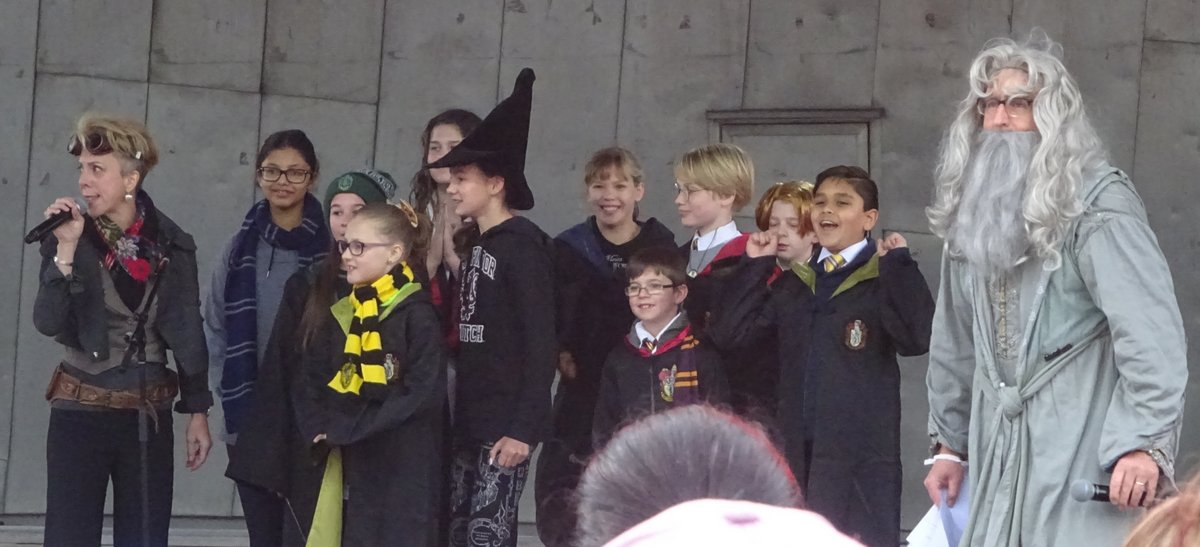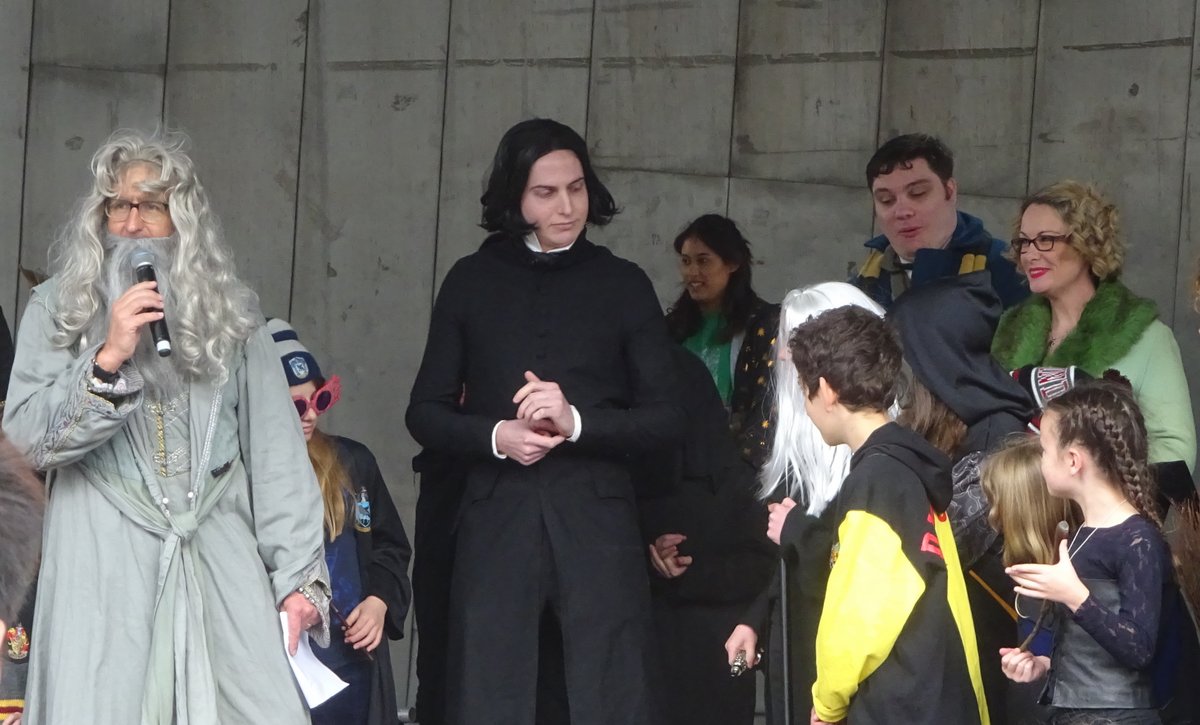Life-changing fiction
Last weekend, I attended a Harry Potter Day at Federation Square, organised as part of the Melbourne Writers Festival. It celebrated 20 years since the initial publication of the Philosopher’s Stone, and considered how much the series had changed the world. Many of those there were not even born when the books were first published, and yet current evidence suggests they are now ardent fans. There were costumes galore, wands, and a general buzz of excitement.
Fiction changes lives.

Harry Potter Day
One speaker commented that at age 9 he had written a story about discovering he was a descendant of Merlin. He loved dragons, giants, and other magical creatures, and wanted a world with more of them. Many years later, Harry Potter came out. Forget the “children’s book” label: this was clearly the kind of book he had always wanted to read.
What else happened? The Completely Improvised Potter troupe improvised a short sketch for us. Levi Pinfold talked about illustrating the house themed 20th anniversary editions of the Philosopher’s Stone. One of the panelists took every possible opportunity to tell us what a terrible person Snape is, and how even the much-loved redemptive arc cannot compensate for his general creepiness and child abuse during the saga. In the afternoon, there was a screening of the Philosopher’s Stone (including some wondrous music from John Williams), and it was good to find I wasn’t the only one to laugh at certain scenes.
Some trivia
One of the events that really got the crowd involved was the trivia competition. It started off as teachers vs students, though clearly the teachers cheated: there is no way they could have got so many answers so badly wrong without outside assistance. As it was, most of the questions were fairly trivial, and some of the student team found it hard to contain their excitement at knowing the right answer.
Later, some of the questions were crowd-sourced, showing once more how much the crowd knew and appreciated the books. One small child based their question on an elaborate fan theory, trying to demonstrate that it was really Sirius who gave Harry his first broomstick (hint: it wasn’t a Firebolt). I didn’t agree with the questioner’s reasoning, but it’s a sign of the strength of the world J.K. Rowling built that people will go to the trouble of exploring and discovering such trivia.

Costume Parade
But the event that got the most audience participation was the costume parade. It seemed the most commonly represented character was Hermione, though there were plenty of Harrys and Rons, and even a young Hedwig. Dumbledore as MC was joined by several other Dumbledores. There was a very effective Snape, a Malfoy with a snake headed cane, a dementor in a tattered robe, an entire Lovegood family, and a Rita Skeeter appropriately decked out in green, quill at the ready. There was even a Newt Scamander, suitcase in tow (obviously someone trying to be a bit more current).

The Buzz
Events like this generate a real buzz. People were excited, and in spite of the forecast rain they clearly wanted to be there. There was plenty of laughter, and plenty of joy. It was more visible in the children present, but I’m sure some of the older ones present had, like me, been following the series from early on. They had been the people who queued up to buy the latest book on release day, or donned their latest costume to attend a midnight screening of the latest film. What’s more, some of them had then passed on the love to their own children.
When I was in the UK last year, I went to several Harry Potter related destinations. The Warner Brothers Studio Tour in particular was one of the best places I visited while staying in historic London. You won’t find me in costume (I may not even look excited), but the atmosphere and the excitement and the enthusiasm of the more enthusiastic fans really makes such events special.
Last year, the excitement ramped up again with the release of the Cursed Child on July 31. It seemed that every bookstore in England had elaborate advertising for their launch arrangements more than a month in advance, along with reminders to pre-order to avoid disappointment. On the day itself I was in Edinburgh, and there was certainly excitement there (followed by disappointment on finding it was only a play script). Later in the year, Fantastic Beasts was also popular. As usual, I wasn’t queuing up to be in on the first day, but enjoyed both when I eventually got round to reading/watching them.
In short, Potter-mania is not going away, and it shows in some surprising ways: Apparently there’s a real-world Quidditch World Cup, and the Australian Dropbears won it in 2016 (see here for a previous post with other examples).
Ah, but is it true?
Some think that reading or thinking about fiction is wrong simply because it’s not true. As the good book says, think on “whatsoever things are true”. Even if fiction is permitted, some genres are dismissed as “mere escapism”. Children’s books and fantasy are particularly prone to this accusation, and Harry Potter is both.
Certainly the books provide entertainment, and one reason Harry Potter retains its popularity and continues to be re-read is that it appeals to all ages, not just children. The books grew along with the readers, so it was never fair to classify the entire series as children’s tales anyway. When I read the series again a couple of years ago, I felt that they were much better than I remembered. But I also felt they contained powerful life lessons and provided a lens through which we could explore the world.
Children (and adults) are mostly able to separate fiction from reality. But they are also able to take examples from fiction and apply them to real life. These books have a powerful effect on the real world, and they assist with building community and providing a shared reference point for an entire generation. The related fan clubs and special events have given some a sense of belonging and purpose. They have even been credited with encouraging a generation of children to read. Is that not truly valuable?
What would Dumbledore do?
One of the speakers mentioned that some people consider what Dumbledore would do before making decisions. Presumably the idea came from the Christian “What would Jesus do?” craze. And it’s not such a crazy idea: Dumbledore may be a little mad, but he does excellent quotes.
The same could be true for Harry Potter himself. Neither character is perfect, and both do things that we wouldn’t want children to copy (in fact, the same can be said of Jesus). But they all have important messages.
For Dumbledore, here are a few of his quotes that I see quoted most often:
“It does not do to dwell on dreams and forget to live.”
“Happiness can be found, even in the darkest of times, if one only remembers to turn on the light.”
“Dark times lie ahead of us, and there will be a time when we must choose between what is easy and what is right.”
All three are valuable life lessons. In particular, I’ve seen many people say this is where they learned the importance of looking for the right thing rather than just taking the easiest option. While the books do present us with a clear “right” (with flaws) and a clear “wrong” (though not irredeemably bad), this message is subtly different. Sometimes, taking the easy way out is not a matter of right and wrong: since both decisions can be justified, why not take the path of least resistance? However, both Dumbledore and Harry stood up firmly against the odds for things they believed in, and readers can learn to do the same.
Moving on from Dumbledore, Harry teaches readers important virtues. He has a strong sense of right and wrong, friend and foe, and is fiercely loyal to his friends. Yes, sometimes he does stupid things trying to protect his friends, and sometimes he is too quick to dismiss all Slytherins, but he shows the courage and warmth of the Gryffindors.
Coming from outside the wizarding world, he is unaware of the many prejudices in the society: purity of blood, class status, and the inferiority of non-human creatures. However, when he is exposed to these prejudices, he refuses to accept them. When Malfoy suggests that some wizarding families are better than others, he makes his own judgement. When a humble house elf comes to speak to him, he treats him as an equal rather than an underling, and even works to free him (that is why Dobby loves him). And it is said that those who read Harry Potter are more open-minded and less likely to be prejudiced against minorities.
Even when fighting in the cause of the right, and even when advised by his trusted teacher Lupin, he refuses to accept unnecessary collateral damage:
I won’t blast people out of my way just because they’re there. That’s Voldemort’s job.
The reality is that fictional characters can be role models, particularly for children. The events described may not be true, but the lessons readers learn are true, and can make them better people. For some, particular books of fiction will be life-changing.
Life-saving fiction
The Man Who Sold the Moon is one of my favourite Heinlein stories. D.D. Harriman, the hero, is an Elon Musk like character who wants to get to the moon.
The edition I have (here), has an excellent afterword by Mark L. Van Name. He begged to write that particular afterword because Heinlein’s story had helped save his life. How? Well, as a child facing serious abuse, he had considered killing himself. Interestingly, while he loved the escape of reading comic book fantasies, he recognised that their heroes relied on super-powers that he didn’t have. In Harriman, he found a hero without special abilities who was willing to struggle against the odds:
What I learned from The Man Who Sold the Moon was that I could be my own hero, that I could take care of those who depended on me, that no matter how hard it was, no matter what it took, like D.D. Harriman I could find a way. I would find a way. I did find a way.
Here, a fictional character provided a real life role model. I doubt any amount of good non-fiction could have had that effect. If you’d like to know more, I can highly recommend both the book and the afterword.
In A Christmas Carol, the young Ebenezer Scrooge is left all alone, unwanted and unloved, but finds comfort in tales like The Arabian Nights and Robinson Crusoe. And this is true to life: sometimes, children can be lonely and troubled, and fiction can help provide companionship and meaning. It can even be life-saving, as in the case of one reader of Harry Potter and the Methods of Rationality. He describes how waiting for the next chapter of the developing story added meaning to his life.
Personal
If I had not read fiction in my childhood, I don’t know who I would be, but it would not be me. And so I continue to read fiction today: Some sombre and dark, others light and joyful. Sometimes filled with laughter, other times with anger at injustices explored, and other times with tears.
Part of me is the extremely rational software developer, able to present myself in a business-like manner, get the job at hand done, and generally be a socially acceptable adult. But part of me remains the child who sees the wonder of exploring new worlds, whether through science or through fantasy. The rational side of me digs into the details of how a story came to be the way it is, and keeps an eye out for inconsistencies and plot holes (Harry Potter is full of them…). But the emotional side of me forgives those faults for the joy of a well-constructed and engaging story.
Reading fiction is not a distraction from my goal of “understanding the world”: it is part of the goal. The fiction that I read continues to influence my life and show me more about the world. Some stories have characters that I identify with strongly, while others have characters so different from me that I really want to understand how they tick.
There are certain stories that have fundamentally changed me, some in ways that would be surprising even to the authors of those stories. And maybe one day I’ll find time to write about some of those life-changing experiences.
Conclusion
For my generation, Harry Potter has been very influential. So too have older works like Star Wars and The Lord of the Rings, as well as older characters like Sherlock Holmes. Coming generations are sure to face new pressures, and to do so with different stories to guide them. Right now many deserving stories and characters have fallen by the wayside, and there may well come a time when Harry Potter is only known by academics studying the literature of that obscure language called “English”. However, while the stories themselves may change, I think the power of story to change lives will continue.
Right now, though, Harry Potter is justly celebrated, and those who attended the Harry Potter Day testified that it had changed their lives for the better. What more can we ask?